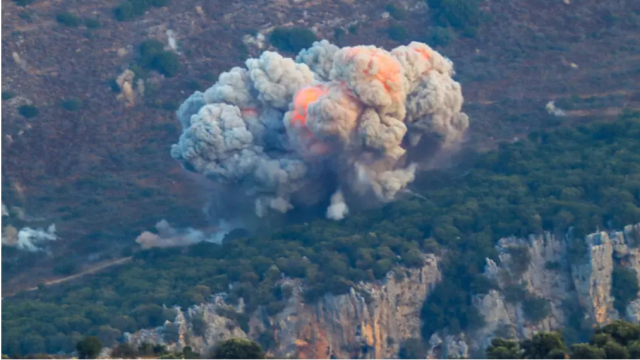Israel intensifies air strikes on Lebanon; urges civilians to evacuate
Israeli military has in recent day hit more than 150 targets in Lebanon

Israel’s military launched renewed airstrikes on Hezbollah targets in Lebanon early Monday, urging civilians in the country to evacuate areas associated with the Hezbollah.
The strikes mark an escalation in the 11-month conflict between Israel and Hezbollah, which has intensified in recent days following a series of cross-border attacks.
1727081974-3/Copy-of-Untitled-(3)1727081974-3.png)
Rear Admiral Daniel Hagari, Israel's military spokesman, warned of "extensive and precise" strikes targeting Hezbollah’s infrastructure, advising Lebanese civilians to "immediately move out of harm's way." Israel claims the militia has embedded weapons within residential areas, making evacuation a necessity for safety.
Lebanon’s health ministry confirmed that at least one civilian had been killed and nearly 20 others injured in the airstrikes across southern and eastern Lebanon, including the Hermel region, over 80 miles from the Israeli border. The attacks, which struck 150 targets, damaged homes and businesses, particularly in towns like Aitaroun.
This follows an Israeli strike last Friday in Beirut, which destroyed a building reportedly used by senior Hezbollah commanders. The strikes, which initially aimed to weaken Hezbollah’s operations, have yet to force the group to retreat.
Hezbollah’s deputy leader, Naim Qassem, declared that the group is in a "new phase" of its battle against Israel. Israeli Prime Minister Benjamin Netanyahu responded by stating that Israel had dealt Hezbollah "a series of blows it could have never imagined."
1727081974-2/Copy-of-Untitled-(4)1727081974-2.png)
The growing conflict, which began with tit-for-tat exchanges after the Gaza war in October, has killed hundreds in Lebanon, with fears mounting over a potential full-scale war.
Last Friday, Israeli airstrike targeting Hezbollah commanders killed at least 37 people, according to Lebanese authorities.
The strike, which leveled a residential building in the capital's southern suburb, is the deadliest in nearly a year of escalating conflict between Israel and Hezbollah.
Hezbollah, confirmed that 16 of its members, including senior leaders Ibrahim Aqil and Ahmed Wahbi, were among the dead.
Israel’s army stated it had targeted an underground meeting of Aqil and Hezbollah's elite Radwan forces, claiming the attack severely weakened the group’s military command structure.
The strike also killed civilians, including three children and seven women, according to Lebanon's health ministry.
Lebanon's Health Minister Firass Abiad confirmed that children were among the victims as rescue crews continued combing through the rubble.
Cross-border violence has intensified, with Israeli warplanes bombing Hezbollah targets in southern Lebanon on Saturday.
The Israeli military reported hitting around 180 targets, including rocket launch sites.
The ongoing hostilities come amid Hezbollah’s vow to continue fighting Israel until it agrees to a ceasefire in Gaza, where Israeli forces have been engaged in an intense campaign against Hamas since early October.
Lebanon’s Prime Minister Najib Mikati canceled his trip to the UN General Assembly in New York in response to the escalating situation, as diplomatic efforts to prevent a broader conflict in the region have so far been unsuccessful.
With over 70 deaths in Lebanon this week alone, the conflict's toll has risen to more than 740 since October.
Earlier this week, 39 people were killed and thousands injured when pagers and walkie-talkies used by Hezbollah, the Iranian-backed militia and political group, exploded over two days across Lebanon.



















COMMENTS
Comments are moderated and generally will be posted if they are on-topic and not abusive.
For more information, please see our Comments FAQ